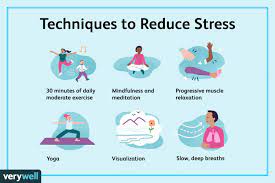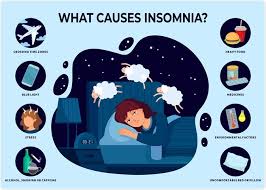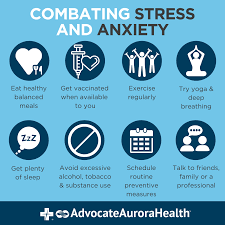Anxiety Disorder Stress Management: Strategies for Coping
Living with an anxiety disorder can be challenging, as the constant worry and fear can significantly impact your daily life. However, there are effective strategies for managing stress and coping with anxiety that can help you lead a more balanced and fulfilling life.
Identify Triggers
One of the first steps in managing anxiety is to identify your triggers. Whether it’s certain situations, thoughts, or behaviors that exacerbate your anxiety, recognizing these triggers can help you develop coping mechanisms to deal with them more effectively.
Practice Relaxation Techniques
Implementing relaxation techniques such as deep breathing exercises, meditation, or progressive muscle relaxation can help calm your mind and body during periods of heightened anxiety. These practices can promote a sense of peace and reduce stress levels.
Maintain a Healthy Lifestyle
Eating a balanced diet, getting regular exercise, and prioritizing sleep are essential components of managing anxiety. A healthy lifestyle can positively impact your mental well-being and provide you with the energy needed to cope with stressors effectively.
Seek Support
Don’t hesitate to reach out for support from friends, family members, or mental health professionals. Talking about your feelings and experiences with trusted individuals can offer emotional relief and provide you with valuable insights on managing anxiety.
Practice Mindfulness
Mindfulness involves staying present in the moment without judgment. By practicing mindfulness techniques such as mindful breathing or body scans, you can cultivate awareness of your thoughts and emotions, allowing you to respond to them in a more constructive manner.
Set Boundaries
Establishing boundaries in your personal and professional life is crucial for protecting your mental health. Learning to say no when necessary and prioritizing self-care can help prevent feelings of overwhelm and reduce anxiety levels.
Conclusion
Managing stress associated with an anxiety disorder requires a combination of self-awareness, healthy habits, social support, and coping strategies. By incorporating these techniques into your daily routine, you can effectively navigate the challenges of living with anxiety and improve your overall well-being.
9 Effective Stress Management Strategies for Coping with Anxiety Disorders
- Practice deep breathing exercises
- Engage in regular physical activity
- Maintain a healthy diet and stay hydrated
- Get enough quality sleep each night
- Limit caffeine and alcohol intake
- Try relaxation techniques such as meditation or yoga
- Talk to a therapist or counselor for support
- Set realistic goals and prioritize tasks
- Take breaks when feeling overwhelmed
Practice deep breathing exercises
Practicing deep breathing exercises is a valuable technique for managing stress and anxiety associated with an anxiety disorder. Deep breathing helps activate the body’s relaxation response, reducing feelings of tension and promoting a sense of calm. By focusing on slow, deep breaths, you can regulate your nervous system and lower your heart rate, leading to a greater sense of control over anxious thoughts and emotions. Incorporating deep breathing exercises into your daily routine can serve as a powerful tool for enhancing your overall well-being and coping with anxiety more effectively.
Engage in regular physical activity
Engaging in regular physical activity is a powerful tool in managing anxiety disorder stress. Exercise has been shown to release endorphins, the body’s natural mood elevators, which can help reduce feelings of anxiety and stress. Whether it’s going for a brisk walk, practicing yoga, or participating in a high-intensity workout, physical activity not only benefits your physical health but also contributes to improved mental well-being. Incorporating regular exercise into your routine can provide a sense of accomplishment, boost self-esteem, and offer a healthy outlet for releasing pent-up tension and worry.
Maintain a healthy diet and stay hydrated
Maintaining a healthy diet and staying hydrated are essential components of managing stress associated with anxiety disorders. A balanced diet rich in nutrients can support your overall well-being, while proper hydration helps regulate bodily functions and promotes mental clarity. By fueling your body with nutritious foods and ensuring adequate water intake, you can enhance your resilience to stress and improve your ability to cope with anxiety triggers effectively.
Get enough quality sleep each night
Getting enough quality sleep each night is crucial for managing anxiety disorder stress effectively. Adequate sleep plays a significant role in regulating emotions, cognitive function, and overall mental well-being. When you prioritize good sleep hygiene and establish a consistent bedtime routine, you give your body and mind the opportunity to rest and recharge, which can help reduce feelings of anxiety and improve your ability to cope with stressors during the day. Remember, quality sleep is a powerful tool in your arsenal for promoting mental health and resilience against anxiety.
Limit caffeine and alcohol intake
Limiting caffeine and alcohol intake is a crucial tip for managing anxiety disorder stress. Both substances can exacerbate feelings of anxiety and contribute to increased stress levels. Caffeine is a stimulant that can trigger the body’s “fight or flight” response, leading to heightened feelings of nervousness and restlessness. On the other hand, alcohol, while initially providing a sense of relaxation, can disrupt sleep patterns and worsen anxiety symptoms in the long run. By reducing or eliminating caffeine and alcohol consumption, individuals with anxiety disorders can better regulate their emotions and promote a calmer state of mind.
Try relaxation techniques such as meditation or yoga
Incorporating relaxation techniques like meditation or yoga into your daily routine can be highly beneficial in managing stress associated with anxiety disorders. These practices promote mindfulness, calm the mind, and reduce physiological responses to stress, ultimately helping you find a sense of peace and balance amidst the challenges of anxiety. By dedicating time to engage in these activities, you can cultivate a deeper connection with yourself and develop effective tools for coping with anxious thoughts and emotions.
Talk to a therapist or counselor for support
Seeking support from a therapist or counselor can be instrumental in managing anxiety disorder stress. These professionals are trained to provide guidance, tools, and a safe space for you to explore your thoughts and emotions. Through therapy sessions, you can gain valuable insights into your anxiety triggers and learn coping strategies to navigate challenging situations. Talking to a therapist or counselor can offer emotional support, validation, and perspective, empowering you to address your anxiety symptoms effectively and work towards improved mental well-being.
Set realistic goals and prioritize tasks
Setting realistic goals and prioritizing tasks are essential strategies for managing stress associated with anxiety disorders. By breaking down larger goals into smaller, achievable steps, individuals can reduce feelings of overwhelm and increase their sense of accomplishment. Prioritizing tasks based on importance and urgency helps individuals focus their energy on the most critical activities, leading to a more organized and structured approach to daily responsibilities. This proactive mindset can alleviate anxiety related to feeling unprepared or falling behind, ultimately promoting a sense of control and empowerment in managing stress effectively.
Take breaks when feeling overwhelmed
When experiencing overwhelming anxiety, it is essential to prioritize self-care by taking breaks. Stepping away from stressful situations allows your mind and body to rest and recharge, helping you regain a sense of calm and perspective. Taking breaks can prevent burnout, improve focus, and enhance your ability to cope with anxiety triggers effectively. Remember that giving yourself permission to pause and breathe can be a powerful tool in managing stress associated with an anxiety disorder.




